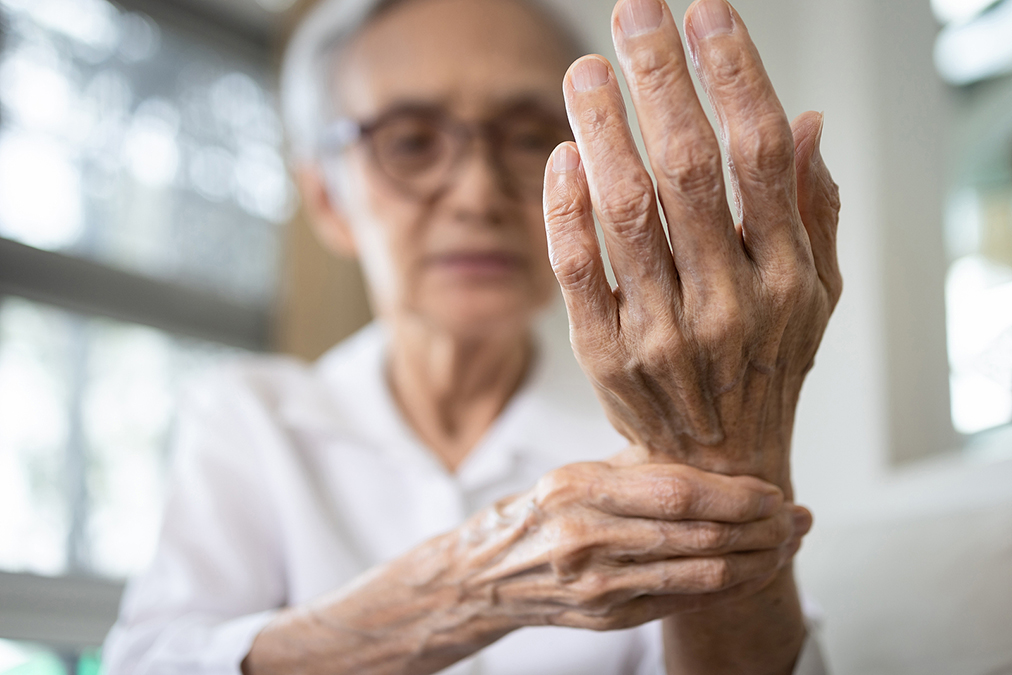 One of the problems with arthritis is that scientists often miss the real underlying cause of this painful condition.
One of the problems with arthritis is that scientists often miss the real underlying cause of this painful condition.
Now a new study in the journal Cell Biochemistry and Function has identified the original cause of arthritis and how to treat it naturally using a specific citrus.
To understand the contribution of this study to the arthritis literature, we need to do a tiny bit of simple biology.
We all know that arthritis involves inflammation. But a lesser-known fact is that free radicals are actually responsible for a lot of the damage to your bones and joints.
When you have rheumatoid arthritis, you suffer a process called the glycation of proteins. This means that sugars attach themselves to the proteins in your joints. This is unhealthy and harms those proteins’ ability to do their job.
Once the proteins have been very badly damaged by glycation, they are called advanced glycation end products. These are not only proteins that can no longer fulfil their biological functions, they are also strong free radicals.
Free radicals like these are very dangerous as they steal electrons from cells all around them to try to repair themselves. But this damages all the tissue that surrounds them, such as in your joints.
This is one of the reasons why arthritis is so destructive.
However, the solution is actually fairly easy. Identify a scavenger of free radicals that either destroys or repairs them, give this substance to arthritis patients, and watch how the destruction of their joints slows down.
This is exactly what the authors of the new study did. They identified a citrus supplement called hesperidin that is known to be a strong scavenger of free radicals.
They performed their study on rats, first injecting their hind-paws with collagen type II suspension to induce rheumatoid arthritis and then giving them a daily hesperidin dose of 50 milligrams per kilogram of body weight for 21 days.
When examining x-rays and tissue samples from the rats’ hind paws, the researchers discovered a much-reduced amount of free radicals and advanced glycation end products, just as they hoped.
This led them to conclude that the radical scavenging activity of hesperidin could make it an effective treatment for rheumatoid arthritis.

 Overcoming IBD
Overcoming IBD Multiple Sclerosis
Multiple Sclerosis Banishing Bronchitis
Banishing Bronchitis Gum Disease Gone
Gum Disease Gone Overcoming Onychomycosis
Overcoming Onychomycosis Neuropathy No More
Neuropathy No More The Prostate Protocol
The Prostate Protocol Brain Booster
Brain Booster
 Ironbound
Ironbound
 Solution for Shingles
Solution for Shingles
 The Bone Density Solution
The Bone Density Solution
 The Ultimate Healing Protocol
The Ultimate Healing Protocol
 The Parkinson's Protocol
The Parkinson's Protocol
 The Chronic Kidney Disease Solution
The Chronic Kidney Disease Solution
 Overthrowing Anxiety
Overthrowing Anxiety The Fatty Liver Solution
The Fatty Liver Solution The Hypothyroidism Solution
The Hypothyroidism Solution
 The End of Gout
The End of Gout The Blood Pressure Program
The Blood Pressure Program
 The Oxigized Cholesterol Strategy
The Oxigized Cholesterol Strategy
 Stop Snoring And Sleep Apnea Program
Stop Snoring And Sleep Apnea Program
 The Arthritis Strategy
The Arthritis Strategy The Vertigo & Dizziness Program
The Vertigo & Dizziness Program The 3-Step Diabetes Strategy
The 3-Step Diabetes Strategy Hemorrhoids Healing Protocol
Hemorrhoids Healing Protocol The Erectile Dysfunction Master
The Erectile Dysfunction Master Weight Loss Breeze
Weight Loss Breeze The IBS Program
The IBS Program The Insomnia Program
The Insomnia Program The Migraine and Headache Program
The Migraine and Headache Program The Neck Pain Solution
The Neck Pain Solution The Menopause Solution
The Menopause Solution The Ejaculation Master
The Ejaculation Master The TMJ Solution
The TMJ Solution The Acid Reflux Solution
The Acid Reflux Solution The Fibromyalgia Solution
The Fibromyalgia Solution The Psoriasis Strategy
The Psoriasis Strategy